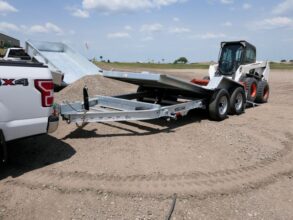The One-Fuel Solution
By Jeremy Wishart
Any landscape contractor knows that managing and predicting hard costs is one of the keys to ensuring their bottom line stays in the black, and business is successful. With gasoline and diesel prices hovering near $4.00 a gallon and no relief in sight, fuel consumption is increasingly becoming a hot topic for contractors. It’s also why landscape professionals are turning to propane as a one-fuel solution for their mowers, pickups and portable generators.
When used across an entire fleet, fueling with propane eliminates the guesswork of predicting conventional fuel prices, and is a versatile, environmentally and budget- friendly solution to managing “uncontrollable” costs.
No better time than the present
Propane has gained a reputation in the commercial mower market as an alternative fuel that reduces emissions and can bolster a business’s sustainability program. Today, contractors are recognizing the fuel for its strong return on investment and increased fuel savings.
With a deeper lineup of propane-fueled equipment options from which to choose — including mowers, trucks and portable generators — contractors who have adopted propane throughout their operations are reaping benefits beyond the bottom line. They are reducing downtime and improving employee efficiency with an abundant, affordable and American-made fuel.
Advancements in shale gas exploration in the U.S. have created a surplus of domestic propane, encouraging manufacturers to invest in new propane-fueled technologies. More than a dozen manufacturers offer propane-fueled mowers, including BigDog, Bob-Cat, Dixie Chopper, EnviroGard, Exmark, Ferris, Gravely, Husqvarna, Hustler, Kubota, Metro Lawn, Scag, Snapper Pro, Toro and Zipper. New, factory-built models are also available for propane, such as Exmark’s Lazer-Z S Series line, which features the only propane-dedicated electronic fuel injected engine from Kohler.
Beyond mowers, Roush CleanTech — a Qualified Vehicle Modifier (QVM) supplier for Ford — and CleanFuel USA — in partnership with General Motors — offer dedicated OEM-supplied propane autogas pickups and work trucks with extended manufacturer warranties on a variety of vehicles. Bi-fuel trucks are another smart option for contractors who run higher-mileage routes, and there are several aftermarket bi-fuel conversions available for nearly any make or model. Propane-powered portable generators, such as Generac’s LP5500, are ideal for recharging lithium-ion-battery-powered handheld equipment in the field.
Steps to adoption
First, landscape contractors need to assess their current equipment lineup, asking themselves if equipment is relatively new or ready to be replaced. If equipment needs to be replaced, landscapers should begin by researching propane-fueled mowers, trucks and equipment, and consider speaking with a local equipment dealer about a demonstration unit.
Though it may be tempting to convert older equipment to run on propane, it’s crucial to understand that regardless of fuel type, an old and abused machine is going to perform poorly, which may lead to negative first impressions. Additionally, contractors should track propane usage (price, consumption, etc.) and compare data to equipment of the same size, power and operating condition to fully realize the cost savings potential.
When equipment is still in good mechanical and operating condition, contractors can consider converting to propane. Several aftermarket manufacturers offer conversion kits that provide the same performance as their gasoline counterparts. Conversion kit manufacturers typically work with a propane retailer or through approved conversion centers.
Landscape professionals should also consider talking to colleagues in the region. Firsthand testimonials from propane-fueled equipment users can be an invaluable local resource for information and sharing of best practices.
Overcoming refueling obstacles
Contractors are often hesitant to adopt propane because they’re concerned about refueling options and fuel availability. A propane retailer can offer a wealth of information and support suited for a contractor’s business operation.
Retailers make the refueling process simple and convenient, and, depending on the size of the fleet, can set up one of two refueling methods: a cylinder exchange program or the installation of on-site refueling infrastructure. In a cylinder exchange program, the propane retailer delivers full propane cylinders and collects used ones from a contractor’s rack as many times during the week as needed. On-site refueling infrastructure allows contractors to refuel their own propane cylinders from their own bulk tank.
Upfront costs of acquiring cylinders or installing infrastructure are another typical concern for contractors. However, retailers can offer solutions to help cover costs, including writing the price of spare cylinders or refueling infrastructure into a fuel contract to be amortized over a longer period of time. Additionally, federal tax credits can recoup up to $30,000 or 30 percent of the total cost of installing on-site infrastructure and refueling dispensers. Landscapers interested in learning more about state and federal incentives can consult the Alternative Fuels Data Center (www.afdc.energy.gov/laws) and the IRS (www.irs.gov).
Contractors should also keep in mind that propane-refueling stations are often the most cost-effective of all fuels. Propane requires minimal site prep and permit requirements and typically costs less over time than conventional fuel infrastructure.
Eliminate the risks of ethanol
Ethanol issues in the lawn and landscape industry are nothing new. Ethanol blends can harm fuel system components and performance in engines not designed to operate with the fuel. Hidden costs, such as increased fuel system maintenance and the need for fuel stabilizers, also cut into budgets.
Propane-dedicated small engines, on the other hand, do not require fuel stabilizers for storage, and the fuel doesn’t degrade over time. Because propane is stored in steel or aluminum propane cylinders and propane mowers have closed fuel systems, fuel spills and theft are also eliminated.
Accidentally refueling with ethanol-blended fuel is another rising concern for contractors running gasoline-powered equipment. With propane, there’s no confusion about which type of fuel to use in each piece of equipment. Propane cylinders are marked according to industry specifications. Mower cylinders have both a green-painted collar on the service end, differentiating them from forklift cylinders, as well as left-hand threaded valves, which only allow the cylinders to be used with propane mowers.
Transitioning your fleet
After a contractor understands the steps to adopting propane, the only thing left to do is transition to a one-fuel fleet. Many landscape companies have already converted to a one-fuel propane operation. Others have experienced the benefits of running propane mowers, and have decided to incorporate trucks and generators into the mix.
No matter a contractor’s brand preference, propane-autogas-fueled pickups and propane-fueled mowers and generators are available to suit every need. Propane has proven to be a total solution for contractors interested in greening their fleet while reducing expenses, and is a versatile, abundant fuel they can count on to efficiently power their operations for years to come.
Jeremy Wishart is senior programs manager with the Propane Education & Research Council (PERC).


